Six Ways USAID is Advancing Gender Equality in the Waste Sector
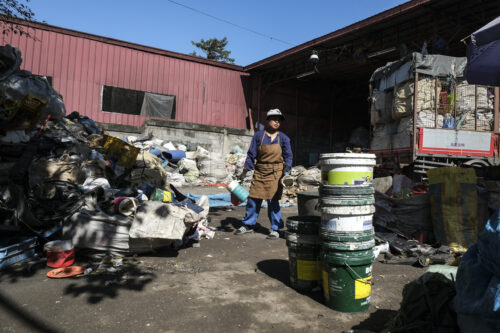
Despite their crucial contributions, women’s work is often unrecognized and under-resourced. They face gendered structural barriers that limit their earning power and opportunities for upward mobility. With limited access to credit, training, and time, women must often work in the informal waste sector where they receive lower income, fewer health and safety protections, and are at heightened risk of gender-based violence.
USAID—through the Agency’s flagship Clean Cities, Blue Ocean program under the Save our Seas Initiative—is responding to the ocean plastic pollution crisis by working with its partner countries in Asia, the Pacific Islands, Latin America and the Caribbean to address these challenges—to provide the tools and resources so that women can successfully participate in and advance local circular economies.
USAID promotes an inclusive and equitable waste sector that integrates all actors in the system. Here are six ways USAID is advancing gender equality in the solid waste management sector through its Clean Cities, Blue Ocean program:
- Creating opportunities for women to establish and expand their waste businesses
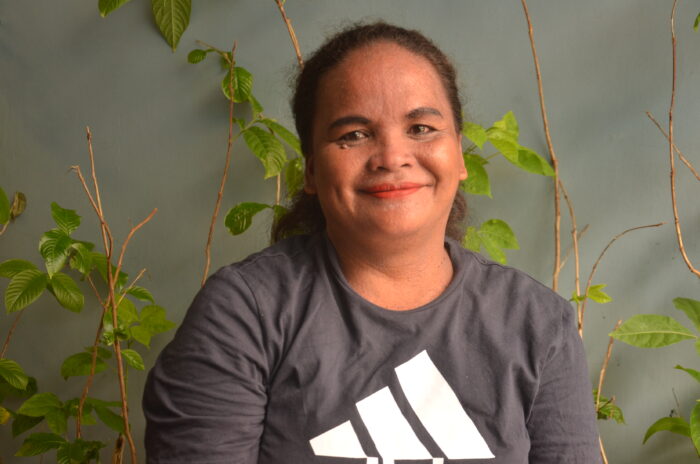
In 2021, USAID launched the Women in Waste’s Economic Empowerment (WWEE) activity where women are offered a blend of business, leadership, and empowerment training, coupled with a small business incubator program that offers mentorship and funding opportunities for establishing or expanding women-owned recycling or waste businesses. In Indonesia and the Philippines combined, more than 400 women have already graduated from the WWEE training program, and 26 women have received grants to expand 14 businesses. Women who received funding through WWEE have already prevented an estimated 40 metric tons of waste from entering the environment, the equivalent of 4.3 million plastic bottles.
Women reported that participating in the WWEE activity has led to increased efficiencies at work, providing more time with their families, to care for themselves, and be active in their communities. They also have reported having newfound confidence to share their ideas with others, form relationships with their peers, and trust themselves. For Riza Santoyo, WWEE’s first funded entrepreneur, the activity helped her establish a door-to-door waste collection business. While working fewer hours, Riza has also doubled her income and built her family’s savings, thanks to new skills and equipment. The activity also helped to build her confidence and change her outlook toward her profession. “There is strong competition in waste collection,” Riza stated. “Through WWEE I learned to be friendly with fellow waste collectors and customers.” Valuing her customers has improved her ability to earn a better living and encourage loyalty.
Learn more about the Women in Waste’s Economic Empowerment activity.
2. Including gender in the local government planning processes
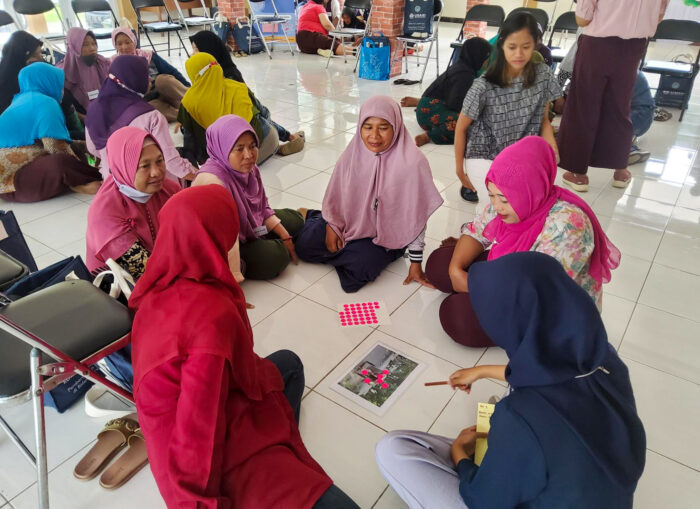
USAID has purposefully developed inclusive gender training to build the capacity of all individuals—for men, women, LGBTQI, and non-binary identified people—who work in the waste sector. Clean Cities, Blue Ocean has provided participatory training to local grantees, members of the informal sector, and government officials and employees in its ten focus countries. The trainings resulted in positive outcomes, from local government officials applying for national gender and development funding for the first time, to engaging more male participation in training to discuss gender based violence and ways to prevent it.
In building the capacity of local government officials to strengthen solid waste management planning, USAID also promotes solid waste management plans that are inclusive and ensure that women’s roles are represented across the waste value chain. For example, in the Philippines, USAID is helping the cities of Parañaque, Iloilo, and Pasig to integrate gender equality in their solid waste management plans consistent with the Republic Act 9710 also known as the “Magna Carta for Women. This comprehensive law seeks to eliminate discrimination through the recognition, protection, fulfillment, and promotion of the rights of Filipino women, especially those belonging in the marginalized sectors of the society. Local governments are mandated to align their ten-year solid waste management plans with the country’s gender mainstreaming program in order to receive support from the city’s Gender and Development Fund.
3. Promoting the safety of women in waste
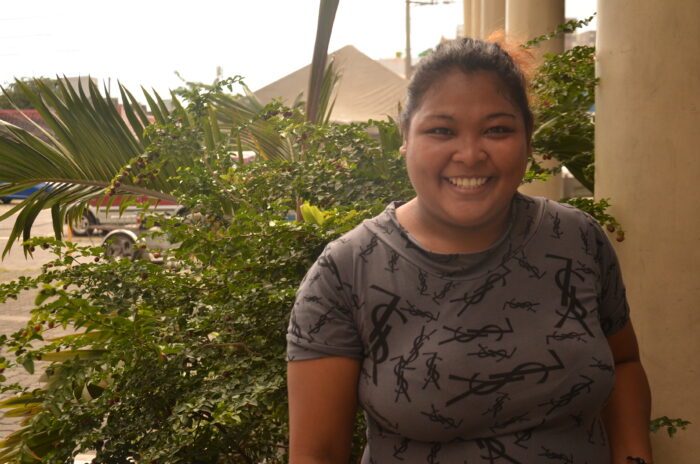
USAID is committed to increasing women’s safety in the waste sector―ensuring gender-based violence is part of its training—for both women and men—and that women have the resources they need to seek help, if needed. The program’s WWEE activity, for example, discusses issues around gender based violence in its business and leadership skills training where participant Jodelyn Gasga learned about the Safe Spaces Act of the Philippines for the first time. “Truth be told, it was only here [at WWEE] where I learned about the rights of women and what to do in case of sexual harassment. I didn’t know about these before.” Since, she has been open to sharing the information with other women in her community for their protection and safety.
Gender-responsive occupational safety and health training is also included in all program activities―including for grantees and local government partners―to promote and provide personal protective equipment that is right-sized and designed for women.
In Puerto Princesa, Philippines, one of USAID’s grantees, Project Zacchaeus, partnered with 60 local informal waste collectors—now regarded as “Eco Warriors”—to create customized uniforms that offer protection from waste and the sun and brand them as professionals to be respected. The uniforms were designed through a co-creation process, which sought the workers’ inputs to ensure they met their unique needs, thus increasing the workers’ willingness to wear the protective gear.
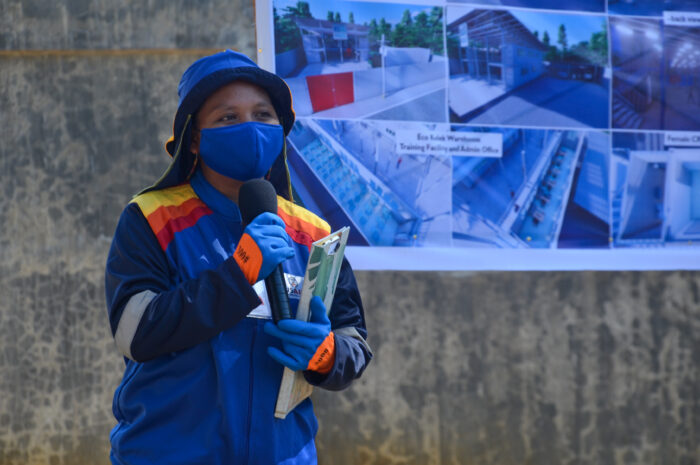
For Eco Warrior Indra Tajari, the uniform also protected her from harassment. “When I collect waste wearing my ordinary clothes, some people say unkind things to me,” she shared. “But when the Eco Warriors and I wore the uniform, people suddenly treated us with kindness and respect.” Even her children were very proud to talk about her to their teachers and friends. The positive interactions and support greatly boosted her self-esteem and confidence in her profession.
Learn more about USAID grantee Project Zacchaeus.
4. Strengthening women’s agency and confidence to be recycling champions
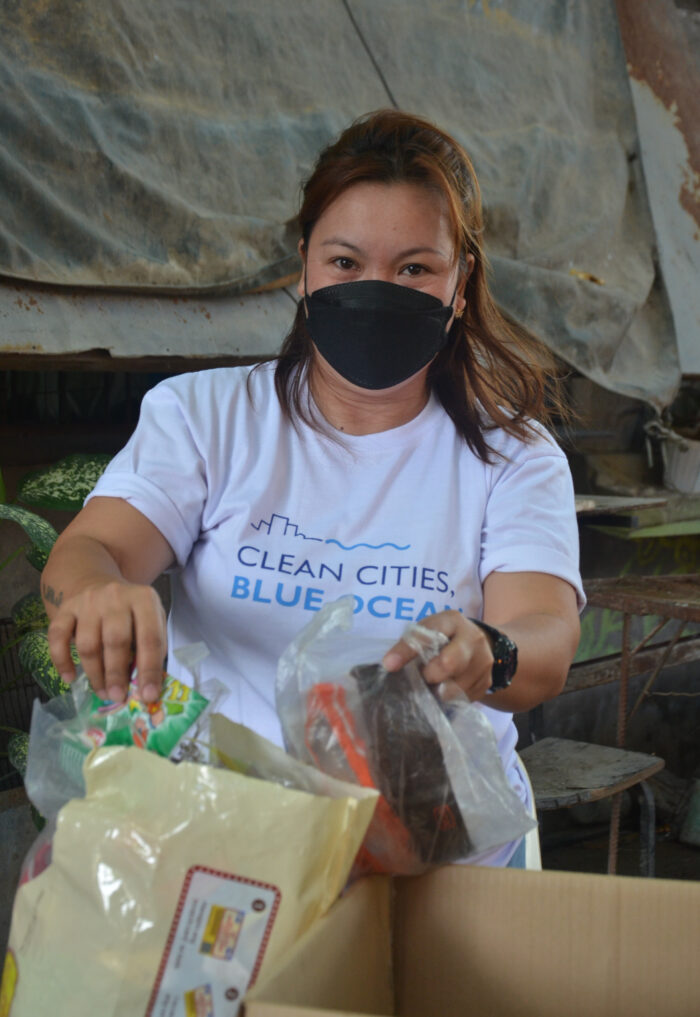
Building the confidence and reducing the stigma of the informal waste sector within the surrounding community can have a profound impact on the quality of people’s lives and waste management systems. Through the Clean Cities, Blue Ocean program, USAID is creating an environment for women in waste to form more supportive, sustainable communities.
In Parañaque City, Philippines, USAID supports women to become community solid waste management champions. Called the Circular Center Women Champions, they were formed by USAID grantee, Communities Organized for Resource Allocation, Inc., through the recommendation of the Parañaque City Environment and Natural Resources Office. Through training, the women have enhanced their knowledge and advocacy skills around waste management to influence their community to practice the 3Rs— reduce, reuse, recycle.
Normina Naral, one of the women champions, started promoting proper waste management among her family and friends. “My vision is for my community to join us in segregating waste,” she said. “It’s hard but I have already convinced a few store owners to segregate.” When another champion, Lourdes Panganiban, joined the Circular Center, her husband had just died a few months earlier. “I didn’t expect I would gain friends who would help me in my grieving process,” she said. “They inspire me. If they can handle their challenges in life, I can handle mine too.”
Learn more about the Circular Center Women Champions.
5. Designing waste system solutions based on gender-inclusive research
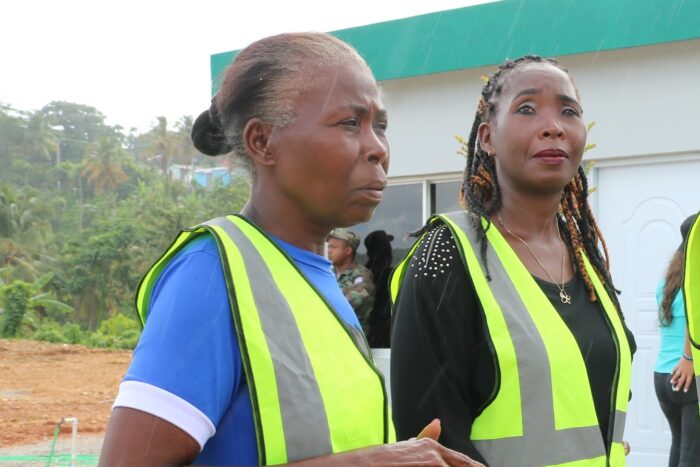
USAID uses social research to better understand women’s roles with respect to solid waste management and the 3Rs. For example, in the Dominican Republic, Clean Cities, Blue Ocean grantee, the Center for the Conservation and Ecodevelopment of Samaná (CEBSE) conducted research on gender and waste to learn who in the household handled waste and how. CEBSE researchers learned that waste handling, except for kitchen waste, is not gendered in Samaná.
Research also sought to identify strategies to enhance women’s economic empowerment in the waste and recycling sector by establishing data on women’s roles in the waste value chain. The research found that women are well-represented at the lowest levels of the waste value chain—such as informal waste collectors—but are noticeably absent from the other levels. Women informal waste collectors are also more likely to experience sexual harassment and gender based violence. Findings were shared with the national and local governments to inform their approach on engagement with the informal sector.
6. Rightsizing technology and facilities for women
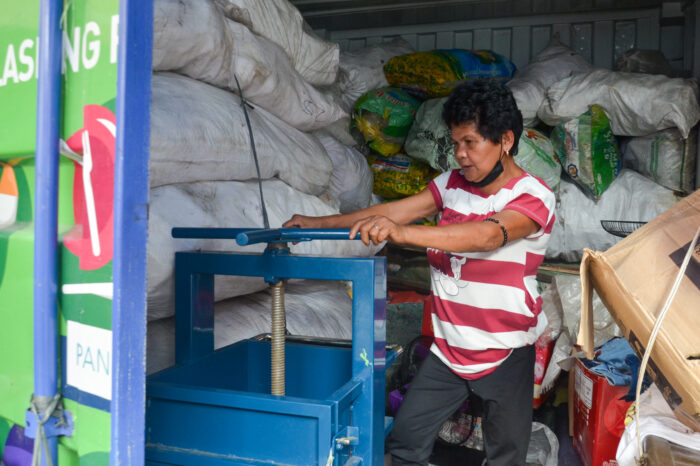
Historically, the tools and equipment used for waste management have been developed as one-size-fits-all. USAID is changing this approach by providing tools and uniforms that are designed to be used by both women and men, and considering the unique needs of each.
Program grantee, the Plastic Credit Exchange, worked with USAID in re-designing manual balers―used to compact plastic for recycling―for its Aling Tinderas, a network of women sari-sari store owners (tiny shops that sell the necessities of daily living) that have turned their businesses into “waste to cash” community recycling stations in the Philippines. Previously, the women had difficulty operating balers as they were poorly suited to their height and build. Aling Socorro, one of the Aling Tinderas, found it difficult to compress the plastic bottles she buys from customers because she could not reach the lever handle. “I’m old already and it hurts my arms,” Aling Socorro said.
USAID and the Plastic Credit Exchange converted the balers’ lever into a screw mechanism that fits the height and strength of Aling Tinderas. Socorro is delighted that she can now compress plastics using the baler and has since been one of the leading Aling Tinderas in Manila―collecting more than 37 metric tons of plastic waste since 2021, the equivalent of 14868,000 plastic bottles.

